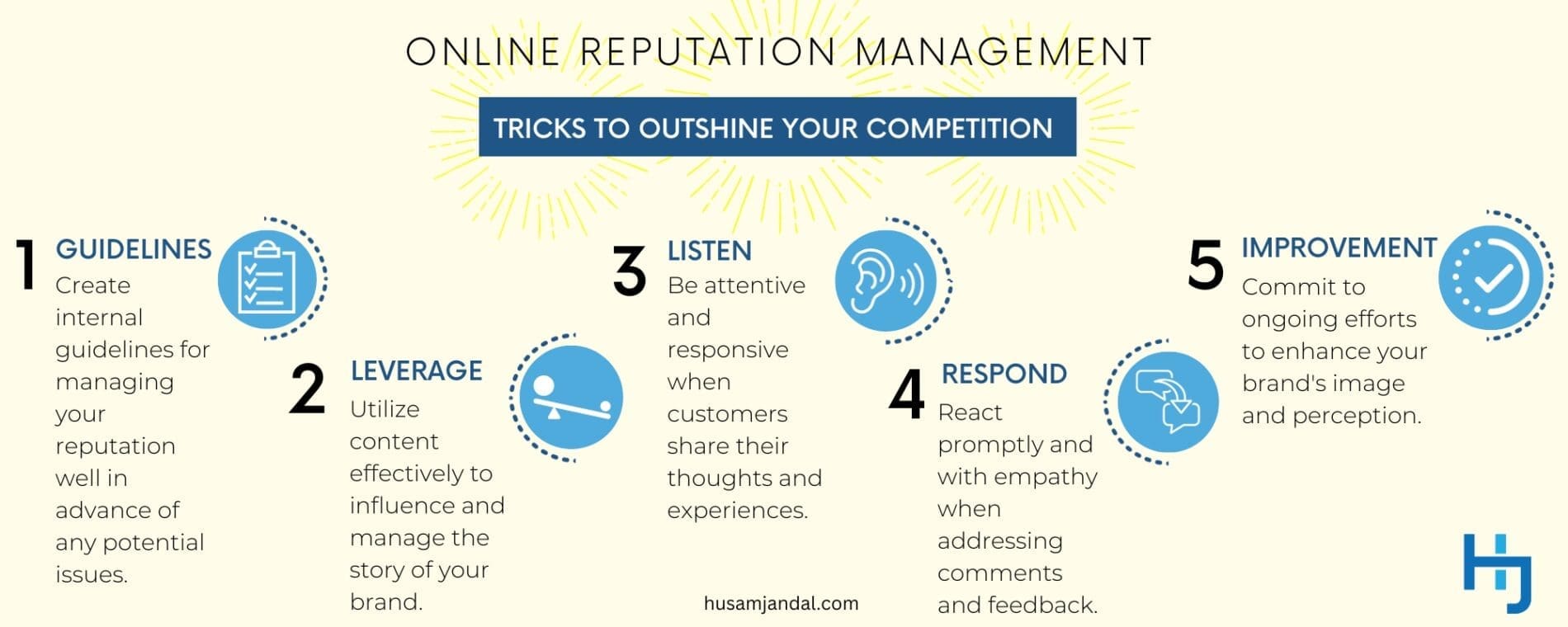 A typical consumer mentions 56 brands in conversation each week, according to Deloitte research. Your brand will become a topic of discussion if it isn’t already, and many of those mentions will happen online. This is wonderful exposure, but all brands will inevitably face negative reviews or comments about them at some point, too. This is where online reputation management comes in.
A typical consumer mentions 56 brands in conversation each week, according to Deloitte research. Your brand will become a topic of discussion if it isn’t already, and many of those mentions will happen online. This is wonderful exposure, but all brands will inevitably face negative reviews or comments about them at some point, too. This is where online reputation management comes in.
What is Online Reputation Management
Online reputation management allows you to control your brand’s story and shape public perception of your company. It’s often thought of as a reactionary process. For instance, if you respond to a bad review that a customer left for your business online, you’re engaging in reactive reputation management. However, you can also take steps to proactively build and preserve your online reputation. A strong reputation management strategy leverages both.
Why Does Business Reputation Management Matter
Investing in online brand reputation management can help you grow your business and increase sales.
Positive Reviews Matter to Prospective Clients
In all, 98 percent of people read online reviews for local businesses, according to BrightLocal. Their research shows that three-quarters of the population does so regularly, and nearly half say they trust reviews as much as recommendations from friends and family. Nearly nine in ten consumers won’t consider a business with an average rating of three stars or less.
Your Online Reputation Impacts SEO and Website Traffic
Because search engines look to third-party websites to gauge the trust and authority of your website, online mentions of your brand can influence search engine optimization (SEO), too. Plus, Google Reviews can influence if, where, and when your business appears in local search results. A solid online footprint with good reviews can exponentially boost your website traffic.
Your Reputation May Skew Negative Due to Human Bias if You Don’t Address It
People are more likely to discuss a bad experience than a good one, Statista reports. For instance, 17 percent of people report recently discussing a poor brand experience on Facebook, while only 15 percent of people with a positive experience discussed it on the platform. Similar gaps are seen on review sites and on X, the platform formerly known as Twitter. In other words, even if you deliver excellent service most of the time, negative sentiments about your brand online will overtake positive ones.
5 Online Reputation Management Tricks to Outshine Your Competitors
Online reputation management is a must for businesses that want to give themselves an edge over the competition. Thankfully, maintaining a strong reputation is simple when you apply the right strategies.
1. Develop Internal Reputation Management Guidelines Before You Need Them
You may already have policies that will become part of your reputation management strategy. At a basic level, reputation management involves things like delivering the best products or services possible, backing them up with great service, educating your team about proper customer care, and developing a positive company culture.
Create Your Reputation Dream Team
As you begin layering in more advanced reputation management techniques, you’ll want to treat it like any other business or marketing initiative. That means starting by defining roles and key players. This will look different for every company. For instance, a very small business may have its social media manager watching all social media channels for customer feedback. At the same time, a slightly larger one may create a specific role for it, establish a role for each channel, or integrate portions of the job into customer service roles. Create clear expectations for those on the frontlines so that they know which tasks to handle and how to address issues effectively. Arm them with the training necessary to do their jobs, tools to help them do it efficiently, and the power to address issues. All too often, people working in direct contact with customers lack the authority to make simple concessions, such as refunding an order or canceling a service. It’s essential to have written documentation showing the steps your team can take and a chain of command for escalating issues as needed.
Warren Buffett once said, “It takes 20 years to build a reputation and five minutes to ruin it.” Given how quickly things spread online today, five minutes is a generous estimate. For this reason, brands must also have a crisis management plan ready. Again, this will vary somewhat for each company but should address things like how to cut off access to social profiles and websites in the event of an emergency and what to do in the event of viral negativity. Similar to your chain of command for issue escalation, you’ll want to set up a crisis response team and identify who should be notified and when they should step in. For instance, if someone alleges that your product harmed them, looping your company’s attorney in before engaging in any serious dialogue is advantageous.
Have Resources Ready
Large brands are prepared for these types of emergencies. Their teams develop a unified front before responding. They bring in lawyers, executives, and public relations firms in dire situations to determine the best approach. They create specialized landing pages to address the issue, send emails to their customers, and develop scripts for their customer service reps to follow. As a small business, you may not be able to launch a large-scale initiative like this, but you should be prepared to mimic it to the best of your ability.
Perform Reputation Audits
You’ll also need to perform reputation audits to review your online presence and look for potential issues and areas that need more coverage online. There are tools designed to help with this, though you can also manually search social media platforms, review sites, and search engines for mentions of your brand and related terms. The first one should occur as you kick off your reputation management strategy. After that, these can be performed monthly or quarterly as long as you’re monitoring in real time.
2. Leverage Content to Control Your Brand Story
I often discuss the value of SEO and content marketing. The premise is that sharing content related to your product or services helps you cultivate and engage audiences. The more high-quality content you share, the more you’re viewed as an authority on the topic in the eyes of readers and search engines alike. Your website appears in more searches and higher on search results pages (SERPs).
This same strategy can be applied to your branding strategy. However, in this case, the more brand-relevant pages you have in SERPs, the more you control your brand story. Your pages appear before others cover the same topic. The more helpful that content is, the less likely you are to have complaints about product use or confusion over the brand, products, and services. For instance, let’s say you produce a guide offering tips for using your product. This proactive measure helps your customers and means you’ll likely see fewer complaints from new customers. It also means that complaints from new customers are more likely to appear lower in SERPs, so you’re effectively choosing which message prospective customers see.
A similar approach can be taken with online reviews. However, you’ll encourage happy customers to leave positive reviews in this case. Nearly two-thirds of people say they’ve left a review after being prompted by a business, according to BrightLocal surveys. In other words, something as simple as asking for a review or sending an email with a link to review your business can increase positive reviews dramatically, thus eliminating the negative bias businesses often face.
3. Listen When Customers Talk
Silence doesn’t mean your customers are happy. Only around a quarter of people will tell your business directly if they’ve had a bad experience, according to Statista. Instead, they share their negative remarks with friends and family or online. If you’re serious about maintaining a strong online reputation, seek these opinions out.
Leverage Customer Service Surveys
Reputation audits can help detect issues, but they’re reactive, and information relay is delayed. It’s better to catch concerns in real time and address them promptly. Customer surveys are an excellent way to do this. They can help you identify dissatisfied customers and address their issues even if they wouldn’t ordinarily share. You can also look for survey trends and identify ways to shore up weak areas in your products or services.
Be Active Where Your Customers Are
The social media profiles you set up as part of your ground fruit initiatives will play a role here, too. You should already have active profiles on the social networks and review sites your customers use. Most platforms have internal tools that notify you when your brand is tagged or mentioned. Confirm this is set up and working so you’re always aware of these discussions as they happen.
Make the Most of Social Listening Tools
Social listening tools can help you catch discussions that happen outside these platforms. Google Alerts, for example, is a free service that notifies you when your chosen phrases are detected online. Set up alerts for all your branded terms and phrases related to your competitors or what you do.
4. Respond to Comments Promptly and Compassionately
Customers are more than twice as likely to use your business if you consistently respond to positive and negative reviews, per BrightLocal surveys. The overwhelming majority expect a response to reviews and social media posts within 24 hours, while many want to hear from you within 60 minutes of posting. Because of this, it’s imperative to have a dedicated team member monitoring and responding in real-time, even if it is just to thank someone for their time.
Some negative comments are inevitable, but interestingly, prospective customers are often more concerned with how your business responds than with the complaint itself. A considerate response from your business has the potential to not only negate a bad review but also make the reader more inclined to use your business than they would have been if the negative remarks hadn’t been left at all. Stay positive during these interactions and move them out of the public eye as quickly as possible. A simple response that says, “This isn’t the experience we wanted you to have. Can you please contact us to provide more details so we can follow up?” may be sufficient. However, preparing several approved responses for your team beforehand is helpful to allow them to de-escalate situations while providing personalized service.
As covered earlier, your team should also be able to make the situation right whenever possible and know who to escalate the issue to when they can’t or the customer isn’t satisfied with the solution.
5. Be a Better Brand
Many brands believe that engaging in social causes helps enhance their reputation. This is only true up to a point. People can spot unauthentic connections from a mile away and don’t respond well. If you choose to use this strategy, only do so with authenticity. Choose a cause that aligns with your mission and values—something that you and your team are genuinely proud to support.
Bill Gates once said, “Your most unhappy customers are your greatest source of learning.” This lesson applies here, too. More than anything else, use the feedback you receive to do better. The strategies I’ve outlined will help you manage your reputation better and, therefore, help boost revenue. However, no online reputation management techniques will be enough to shift your reputation in the long run if your brand isn’t behaving ethically or delivers poor service.
Online Reputation Management Mistakes to Avoid
In addition to the tips covered above, there are a few common mistakes to avoid.
Forgetting About Personal Online Reputation Management
Even though company leadership may not have reviews that customers check, strengthening your personal brand and reputation helps establish you as an authority in your area of expertise and can boost your company’s reputation, too.
Faking a Good Reputation
Oftentimes, individuals and online reputation management services try to take shortcuts. For instance, they might attempt to create fake reviews rather than earning good reviews. Consumers can often catch this based on the language alone, and it undermines the ultimate goal. Moreover, many online review platforms use sophisticated algorithms to detect false reviews. Some, such as Yelp, will even use pop-ups on your profile to warn consumers if there is any suspicious behavior with reviews. This includes incentivizing people to leave reviews too.
Working with the Wrong Online Reputation Management Companies
It’s important to build your online reputation the right way. By caring for your customers and addressing their concerns, you’ll build a stronger reputation, contributing to meaningful growth. This takes time. Be wary of companies that promise you instant results or that openly acknowledge the use of unethical practices.
Get Help Improving Your Online Reputation Management
As a digital marketing consultant with a background in business, I help companies create measurable and sustainable growth. One component of that is building out an online reputation management strategy. If your business needs help in any of these areas, please contact me for a complimentary consultation.




































































